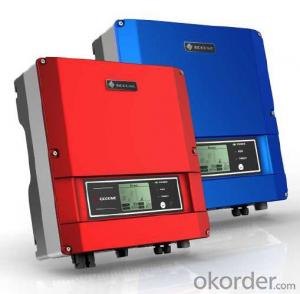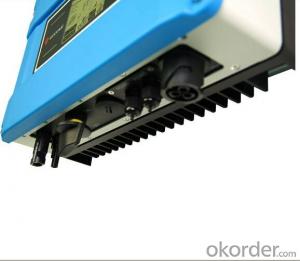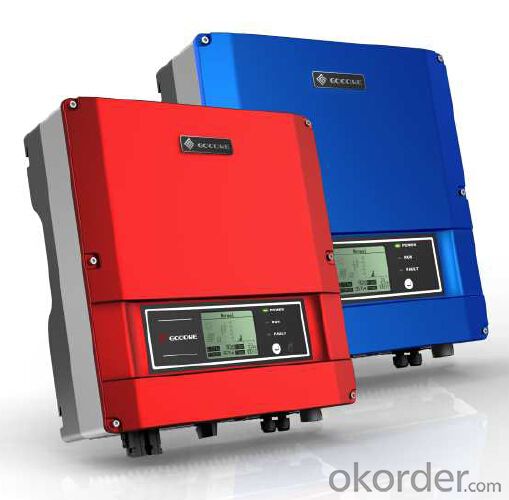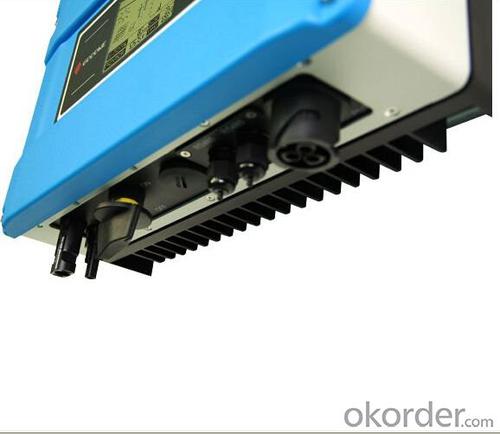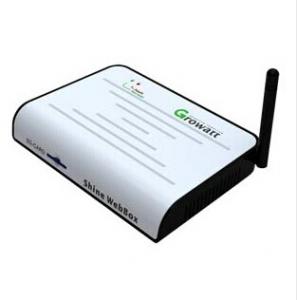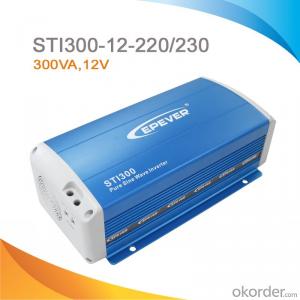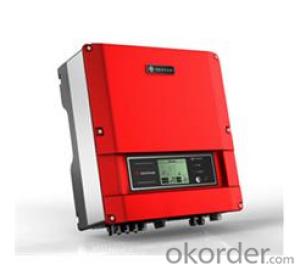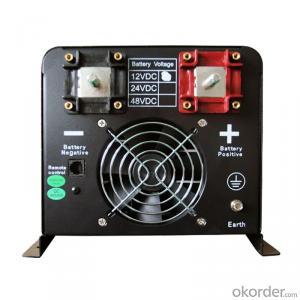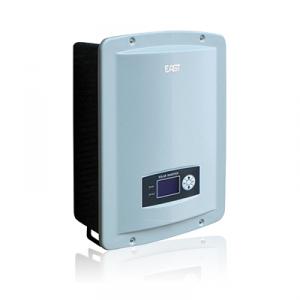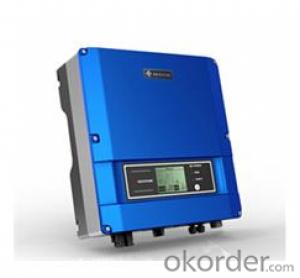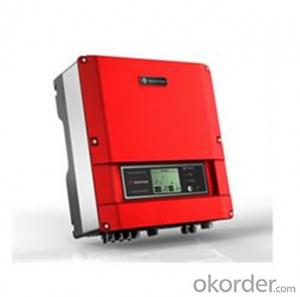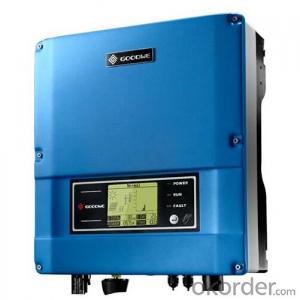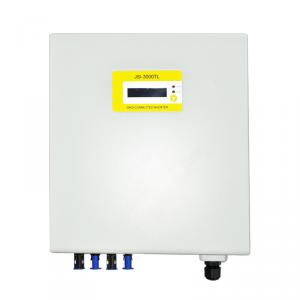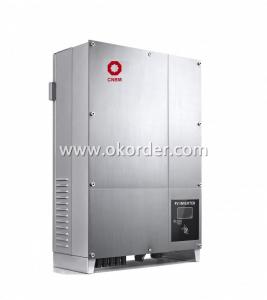Solar Inverter Combo GW3600S-UK
OKorder Service Pledge
Quality Product, Order Online Tracking, Timely Delivery
OKorder Financial Service
Credit Rating, Credit Services, Credit Purchasing
You Might Also Like
GW3600S-UK
The SS series is widely and flexibly used in domestic units because of its wide range of voltage and current inputs.
It features very high conversion efficiency and reliability. SS series provides long-term and stable generating benefits.
The powerful, intelligent, user friendly interface and sleek stylish design make it most suitable for domestic applications.
Datasheet
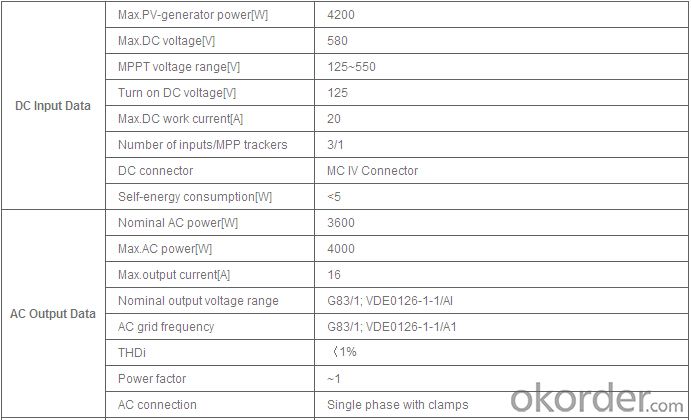
- Q: Are there any noise emissions from a solar inverter?
- Yes, solar inverters generally produce some level of noise emissions. However, the noise generated by modern solar inverters is typically very low and often negligible. The noise is mainly caused by the cooling fans within the inverter, which are designed to keep the device cool during operation. Nonetheless, the noise level is usually not bothersome and should not significantly impact the surrounding environment or living spaces.
- Q: Can a solar inverter be used with a generator?
- Yes, a solar inverter can be used with a generator. In fact, it can be a useful combination in situations where solar power is not sufficient or unavailable. The generator can provide backup power to charge the batteries or directly power the inverter, which then converts the DC power from the generator into AC power for use in electrical appliances and systems.
- Q: How does a solar inverter work?
- A solar inverter works by converting the direct current (DC) electricity produced by solar panels into alternating current (AC) electricity that can be used to power household appliances and be connected to the electric grid. It also ensures that the solar panels operate at their maximum efficiency by tracking the maximum power point and optimizing the power output.
- Q: What are the advantages of using a three-phase solar inverter?
- There are several advantages to using a three-phase solar inverter. Firstly, three-phase solar inverters allow for higher power output compared to single-phase inverters. This is because they distribute the power across three phases, resulting in increased efficiency and capacity. Additionally, three-phase inverters provide better voltage stability and balance across the three phases of a power grid. This is particularly beneficial in commercial or industrial settings where there may be heavy loads and varying power demands. Furthermore, three-phase solar inverters offer improved reliability and durability. They are designed to handle higher currents and can withstand higher temperatures, ensuring a longer lifespan and reducing maintenance requirements. Lastly, three-phase inverters are more cost-effective in large-scale solar installations. They allow for better utilization of available grid infrastructure, reducing transmission losses and optimizing power distribution. Overall, the advantages of using a three-phase solar inverter include higher power output, improved voltage stability, enhanced reliability, and cost-effectiveness in larger-scale installations.
- Q: How the output voltage of the PV inverter and the grid-connected voltage are determined
- supply through the cable to the battery. The use of household appliances connected to the power converter output can be used in the car a variety of electrical appliances. The available electrical appliances are: mobile phones, laptops, digital cameras, cameras, lights, electric razors, CD players, game consoles, handheld computers, power tools, car refrigerators and various tourism, camping, medical emergency appliances Wait.
- Q: Can a solar inverter be used with dual MPPT inputs?
- Yes, a solar inverter can be used with dual MPPT (Maximum Power Point Tracking) inputs. This feature allows the inverter to optimize and extract maximum power from two separate solar arrays or panels. By using dual MPPT inputs, the inverter can handle variations in shading, orientation, or different panel specifications, thereby maximizing the overall energy production and efficiency of the solar system.
- Q: Can a solar inverter be used with a battery backup system?
- Yes, a solar inverter can be used with a battery backup system. A solar inverter is responsible for converting the DC power generated by solar panels into AC power used in our homes. By connecting a battery backup system to the solar inverter, excess solar energy can be stored in batteries for later use, providing power during periods of low or no sunlight, such as at night or during power outages.
- Q: Can a solar inverter be connected to a smartphone app for monitoring?
- Yes, a solar inverter can be connected to a smartphone app for monitoring. Many solar inverter manufacturers offer mobile apps that allow users to monitor and control their solar power systems remotely through their smartphones. These apps provide real-time data on energy production, system performance, and can also enable users to adjust settings and receive alerts or notifications related to their solar power system.
- Q: Can a solar inverter be used with a solar-powered disaster relief system?
- Yes, a solar inverter can be used with a solar-powered disaster relief system. Solar inverters are essential components of solar power systems as they convert the direct current (DC) produced by solar panels into alternating current (AC) that can be used to power various electrical devices and appliances. In the context of a disaster relief system, a solar inverter would be necessary to convert the DC power generated by the solar panels into usable AC power for charging batteries, operating equipment, and providing electricity to support emergency response efforts.
- Q: Can a solar inverter be repaired or replaced if it malfunctions?
- Yes, a solar inverter can be repaired or replaced if it malfunctions. In many cases, minor issues can be repaired by a qualified technician, while more severe malfunctions may require the replacement of the inverter. The specific course of action will depend on the nature and extent of the malfunction, as well as the warranty and service options provided by the manufacturer.
Send your message to us
Solar Inverter Combo GW3600S-UK
OKorder Service Pledge
Quality Product, Order Online Tracking, Timely Delivery
OKorder Financial Service
Credit Rating, Credit Services, Credit Purchasing
Similar products
Hot products
Hot Searches
Related keywords
